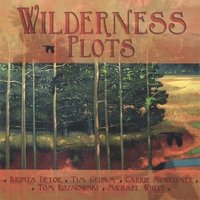|
various artists, Wilderness Plots (Rosehill, 2007) The concept album is an unusual take for a musical release. Willie Nelson's "Red Headed Stranger" is seemingly the most commercially and artistically successful, and one in which a sole artist wrote and performed all the material. Tom Russell's folk opera, "The Man from God Knows Where," was a terrific achievement, with the vast majority of songs written by Russell and performances by a handful of artists.
Made daring by the unique collaboration of singer-songwriters, the major question facing this effort is, does it work? Unabashedly, yes. This collection of songs takes the listener "there" right alongside the menagerie of historical characters. Roznowski's "Whenever I Look at Trees" opens the selections. Singing as a settler viewing an ocean of trees and the other diverse elements of nature, but envisioning what will come, one line in particular jumps out: "Whenever I look at trees I see cities." On a later cut, "Living Things," Roznowski sings, "Living here requires you to kill a living thing." How ironic it was left to Dylan so much later to summarize life at that point with his "The Times They Are a Changin'." Newcomer follows with "Biscuits & Butter" vividly detailing the hardships of the settler's journey. With banjo backing, White's eerie "Bones" is primarily but captivatingly spoken word. Detor is next, with "More Than I Dare Say," offering a wonderful tale of a young girl's hopes and dreams. As do the others, Grimm does marvelous work throughout with his contributions, beginning with "Fruit," a tale regaling a land of bountiful harvests but impeded by the need to first eliminate the current residents, the Indians. Later comes Grimm's "Frostbite of the Soul," truly a classic. Sung by Detor and Grimm, Detor's "Aurora Means Dawn" is a compelling song illustrating the conflict within a couple having to choose between staying put with the familiar or striking out for the unknown. A song for all, the lure of a better life elsewhere -- even as a stranger in a strange land -- is rooted in all of us. Although obviously bound together and terrific as an aggregate, a number of these songs could easily stand alone as single cuts for radio play. Years ago, General Electric made great use of the tag line "Progress is our most important product." Wilderness Plots more than elaborates on this subject in its own way. [ visit the artist's website ] 
|

Rambles.NET review by Kevin McCarthy 28 July 2007 





|

